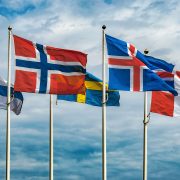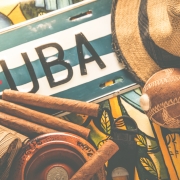In a 1972 edition of the Ayn Rand Letter, Ms. Rand analyzed the Democratic national convention and urged readers not to vote for McGovern: “The worst thing said about Nixon is that he cannot be trusted, which is true: he cannot be trusted to save this country. But one thing is certain: McGovern can destroy it.”
Today’s leading candidate for the Democratic nomination is a staunch defender of Cuban totalitarianism, and Tuesday night he touted their literacy programs, as if they were illiterate. Yet no other candidate or moderator (so-called Americans) had the knowledge or courage to say that Cubans were forced to read Marxist propaganda, and only Marxist propaganda. Below, reposted from a June 2018 article at the Center for Individualism, are some real-time observations about Cuba today.
“Are you allowed to talk about politics” asked a tourist visiting Old Havana. “Oh yes, we can talk about politics – the right kind,” said the tour guide with a wink. And this began a candid and enlightening exchange between a bus load of cruise ship passengers and their Cuban host. During a brief stop he told the group “I am one of Cuba’s Lost Generation. We were born in a time when we were expected to work and deliver the promise of the revolution. Cuba still had wealth. We did not know of the poverty that was to follow.” He was born in the 1960s.
Of Glasnost and Perestroika
“We can discuss anything you like, but not the source,” was his response to another question aboard the bus. For the purposes of this article his name is Alexis. His glasnost is to be highly respected, as he treated his guests, the way the entrepreneurial way works. Alexis then smiled at another nearby passenger who was fooling with her smartphone and slyly asked, “Are you recording this?” The implication was obvious, yet his demeanor remained loose and friendly. A real pro, as Brittany Hunter describes about the Cuban tourism entrepreneurs and their appreciation of Americans.
And this was the rule. Cruise ship passengers disembarking in Havana must first clear immigration, and then currency exchange. Getting a few thousand people off of two cruise ships arriving in a foreign country at the same time requires patience. And the lines moved. The officers were friendly and the money changers were efficient. There seemed to be a silent affirmation that they were damn glad we were there. The process took about an hour, at least on that day. And while the $75 temporary visa fee is heavy handed, and supports the regime, it also provides the workers a source of earned income. And the opportunity to interact with people who enjoy freedom, even those who are clueless about their dumb luck.
“I learned Russian. When the Russians left in 1990, I learned English. That is when Cuba began to open up. Cuba had been closed to tourism except from allied countries. When they left, the government needed other sources of revenue.” Cuba’s perestroika. Alexis was explaining this to those who weren’t busy marveling at the array of old Baroque and Andalusian architecture during the walking tour. When asked about Cuba’s new president not being a Castro, Alexis replied “that is good, but Raul still runs the Politburo.”
Remnants of Soviet influence also remain, particularly their ugly and pathetic cars. It would make sense for the regime to have them disappear and be rid of a sore reminder of their incompetence and corruption. Instead, they display the reality of socialism by having them travel the streets alongside the beautiful 1950’s American automobiles. Another passenger asked Alexis how these cars have been maintained so well for so long. To Alexis it must have seemed like a rhetorical question, but he replied anyway, “The Cuban people are very creative.”
Cubans’ Mojo Rising
Cuba is well known for its world class cigars, rum, and coffee. And apparently during Havana’s heyday as an international tourist mecca (before darkness fell over the island in 1959) they also offered world class Mojito’s and Daiquiri’s. That hasn’t changed either. Two of Ernest Hemingway’s favorite watering holes have the best ingredients and recipes anywhere. When asked about the Mojito, Alexis explained, “we use a special mint with a mild flavor.” A state secret revealed.
The establishment serving them is La Bodeguita Del Medio. While the group waited outside, Alexis was asked if they sell souvenir cocktail glasses, they could make a lot of money after all. He said “No, it’s not allowed. This place is government owned.” The daiquiri joint was a fine, old restaurant named Floridita. A bronze statue of Hemingway was sitting on a bar stool in the corner under a small bust of Vladimir Lenin. In the opposite corner they were selling souvenir cocktail glasses, coasters, and t-shirts. When a naïve American asked the doorman if this was a privately owned restaurant, with a smirk and a shake of his head he replied “No!” Go figure.
On the other side of town Alexis pointed out the window of the bus to a very long line winding around a building. He told his passengers “they are waiting for permission to emigrate to Spain for a better life.” Alexis ended his walking tour in the courtyard in front of the old stock exchange that has been dormant for 60 years. Nearby was the cruise terminal, recently given new life and breathing hope for the people of Cuba. One working symbol of capitalism had moved in where the previous one had been abandoned.
It was a short walk to the dry goods store recommended by Alexis. It was small, well run, and stocked with two each of the best brands of cigars, coffee, and rum. An average single Monte Cristo or Cohiba was 7 convertible pesos, about equivalent to 7 US dollars, or 17,000 Cuban pesos. A perfect example of socialist central banks stealing the wealth of their citizens and squandering it by inflating the currency.
The Sun Also Rises
Ayn Rand continued about the 1972 election,
Here is the difference between them: Mr. Nixon, though not a champion of free enterprise, yearns in that direction. It is against statism that we have to vote. It is statism that has to be defeated – and defeated resoundingly.
Upon leaving the fantasy land that is Old Havana’s tourist district, the luxury cruise ship passengers were able to get a glimpse of Cuba’s reality. Ugly low rise and high rise apartment buildings of Soviet realism design filled the shoreline as the ship passed. It was a perfect summer evening, the sun was setting on the Port of Havana, and yet something was missing.
Earlier that afternoon, a passenger on the pool deck expressed admiration for the “the struggle” of the Cuban people against “crass commercialism,” while sipping a frozen margarita. He could not see it. That morning, the economic gurus on the ship’s elevator were complaining about “innovation taking jobs.” They could not see it. Many dining room guests gazing at the harbor could not see it. All of their minds had been dimmed by American socialist literacy programs. Like the passengers on Ayn Rand’s ill-fated train in Atlas Shrugged, they were indirectly contributing to the disaster.
The thousands of windows overlooking the harbor were completely dark. The residents had no electricity, at least not then. Only the headlights of a few cars moving along the shore way exposed signs of life. The reason is obvious, socialist economic planners are in the dark about allocating the resources needed to efficiently operate a complex system. This always leads to a complete breakdown in production. It’s not that the dictators are restricting electricity, it’s that they can’t produce it. This leaves everyone in the dark, literally. However tomorrow’s arriving cruise ships will bring more light, and not just their own. They foretell the approaching light of free markets.
And it turns out Alexis also kept something in the dark. The Lost Generation is a lot more than Cuban children born into a socialist nightmare. The Lost Generation had been made famous in Hemingway’s greatest work, The Sun Also Rises. It described a generation of real people thought to be irreparably damaged by World War I, but proved themselves to be resilient and strong. Creativity and strength also describes Cuba’s Lost Generation, and belies Alexis’ modesty.













